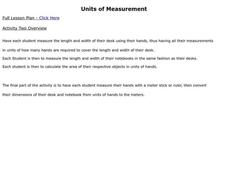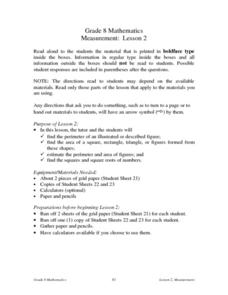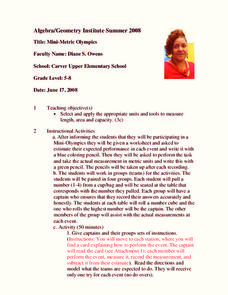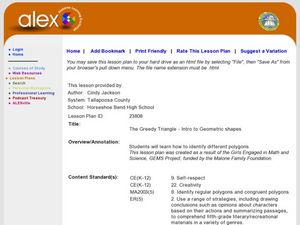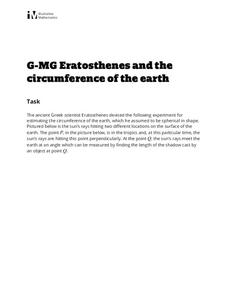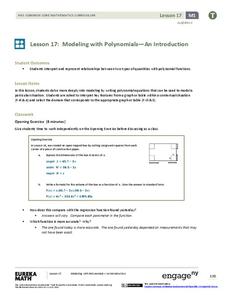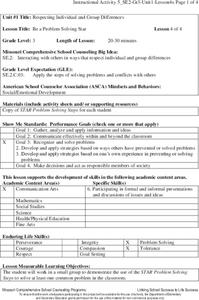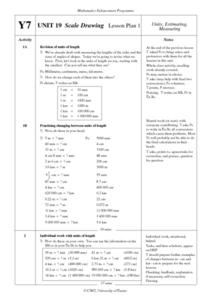Curated OER
Units of Measurement
Students measure the length and width of their desk using their hands. They measure the length and width of their desk. Students measure the length and width of their notebooks in the same fashion as they did their desk. They...
Curated OER
Measurement: Lesson 2
Fourth graders find the perimeter of a geometric shape by adding the lengths of the sides. They find the area of a square or rectangle by counting square units. Students use multiplication to find the area of a rectangle. They estimate...
Curated OER
Get the Turtle to the Pond
Young scholars estimate length and angle measure. They are asked to enter a sequence of LOGO commands to help the turtle get to the pond. Students write their own solutions using LOGO commands and input them into the computer.
Curated OER
Body Part Measurements
Second graders participate in a review of how to use rulers and yard sticks while collecting measurement information. They measure assigned body parts and chart the data on collection sheets. They make a spreadsheet with the information...
Curated OER
Taking Estimation and Measurement Outside
Eighth graders gain a better understanding of visual distances and estimation. They actively practice using metric measurement and conversion. Students practice cooperative exploring and team building.
Curated OER
Mini-Metric Olympics
Students participate in a Mini-Olympics with measurements. For this measurement lesson, students throw items and predict how far they will go. They measure the actual distance and find the difference between that and their estimate.
Curated OER
Introduction to Measures of Central Tendency and Variability
Young scholars calculate the mean, median, mode, range, and interquartile range for a set of data. They create a box and whisker plot using paper, pencil and technology.
Curated OER
The Greedy Triangle-Intro to Geometric Shapes
In this geometry lesson, learners read The Greedy Triangle and use geoboards to construct geometric shapes. They identify the number of sides and angles each shape has.
Illustrative Mathematics
Eratosthenes and the Circumference of the Earth
The class gets to practice being a mathematician in ancient Greece, performing geometric application problems in the way of Eratosthenes. After following the steps of the great mathematicians, they then compare the (surprisingly...
Cornell University
Mechanical Properties of Gummy Worms
Learners won't have to squirm when asked the facts after completing an intriguing lab investigation! Hook young scholars on science by challenging them to verify Hooke's Law using a gummy worm. Measuring the length of the worm as they...
Civil War Trust
Map the Civil War
Mapmaking was a very important element in successfully planning attacks on enemies during the Civil War. Guide pupils through the process of pacing to find the average length of their steps, measure the distance between one object to the...
Teach Engineering
The Amazing Red Planet
Introduce your class to Mars with a resource that provides information about its size, location, length of day, length of year, number of moons, and average temperature. Also includes is information about the lans for past and future...
Curated OER
Decimals Decide Olympic Champions
The class discovers how a decimal can make all the difference in the Olympics. As they learn about decimal place values, they compare and contrast data and demonstrate decimal values using manipulatives.
EngageNY
Modeling with Polynomials—An Introduction (part 2)
Linear, quadratic, and now cubic functions can model real-life patterns. High schoolers create cubic regression equations to model different scenarios. They then use the regression equations to make predictions.
Missouri Department of Elementary
Be a Problem Solving Star
Reach for the STARs! Using the resource, scholars review the STAR (Stop, Think, Act, Review) method and discuss how to use it to solve a math equation. Next, small groups collaborate to solve a common problem in the classroom using the...
Alabama Learning Exchange
Are You a Square or a Rectangle?
Discover the difference between standard and non-standard units of measure with your class. They differentiate between rectangles and squares, read a book, measure a peer's height. They then discuss measurement methods, make...
Curated OER
Does Sunlight Effect Leaf Size?
Students make estimates and then measure leaves for accuracy. They calculate the area of the leaves by drawing an outline on graph paper and counting the squares. They compare the leaves exposed to sunlight to those that are in constant...
Curated OER
The Tilt of the Earth And the Seasons
Fourth graders measure the change in the size of their shadow over time. They visit a fixed structure and record the date, the time, and the measurement of the length of their shadow. They do this over the course of the school year. They...
Curated OER
Area
Third graders find areas of rectangles by using square units, apply knowledge to real-life situations, and simplify method of counting square units by multiplying the length times the width.
Curated OER
Perimeter
Students study about perimeter and the units used to measure perimeter using a variety of materials including their hands, feet, rulers, and computer applets. They understand such attributes as length, area, weight, volume, and size of...
Curated OER
Scale Drawing Lesson Plan
Students calculate actual building measurements from a village map using concepts of ratios and scale in this ten lesson mini-unit. They practice measuring angles, multiplying decimals, estimating height and length, and converting metric...
Curated OER
How Big Is Your Smile?
Pupils measure their smile with a piece of string, which is then measured on a ruler (metric of course!). They take a piece of string and cut it to the length that matches their smile and then measure it with a ruler.
Curated OER
Volume of a Rectangular Prism
Children use the length, width, and height of an object to calculate the volume of a rectangular prism. They observe how to multiply three numbers at a time, and define volume. Pupils observe as the teacher demonstrates how to determine...
Curated OER
Exploring Pythagorean Theorem
Eighth graders explore the Pythagorean Theorem. They use Geometer's Sketchpad and explore features of various figures. Students use the software to build a figure using the given measurements.


